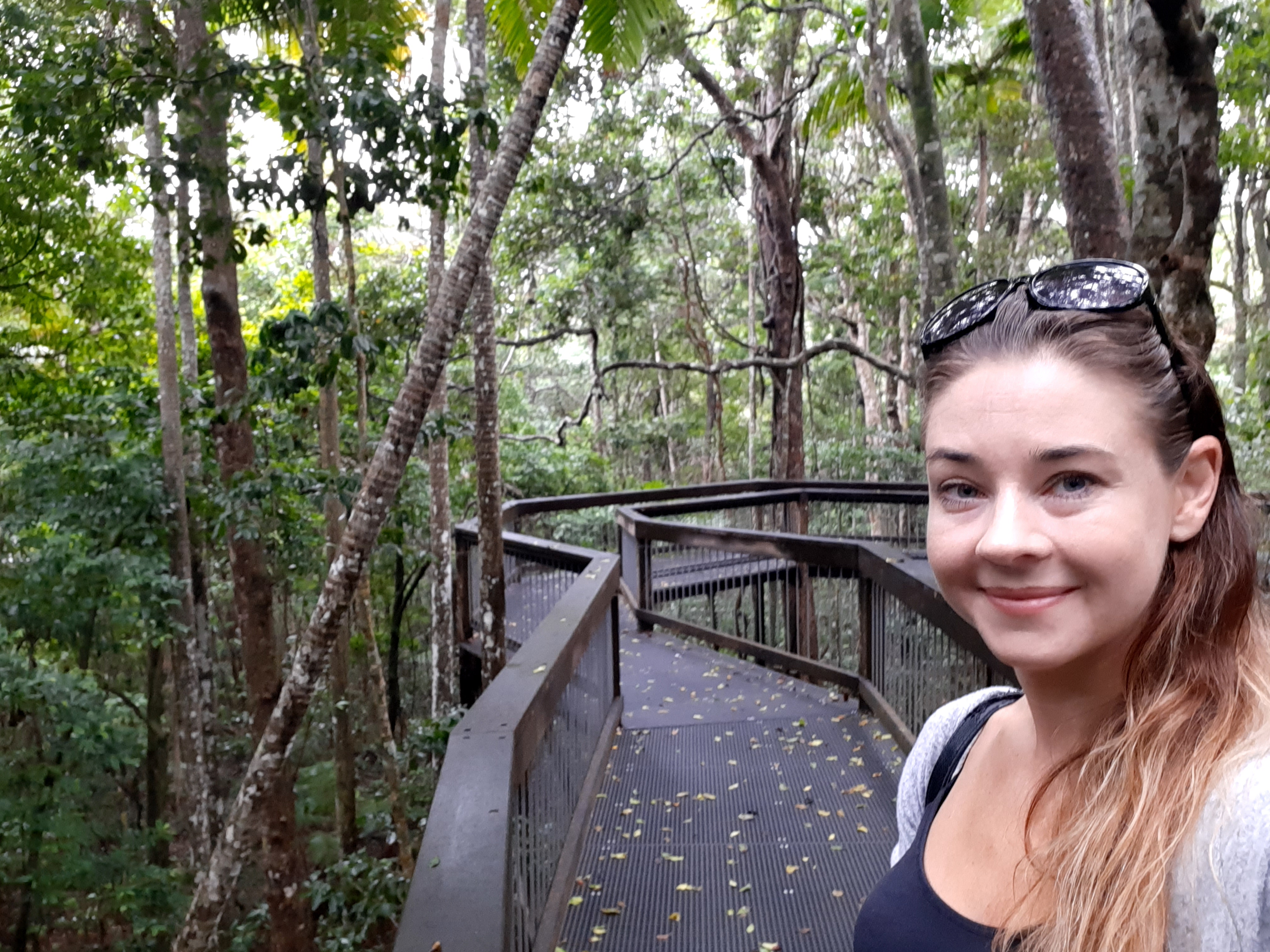
Janet Caddick was first bitten by a tick when she was 18 months old and living on a farm in a small rural community in South Africa.
“I was such an energetic, active child always bouncing around like a flea earning the pet name ‘bugs’ from my father,” said Janet.
Janet was a high achiever and straight A student from a very young age. She tried numerous sports throughout her early school years finally settling on gymnastics and rock climbing during high school.

Janet when she was younger in South Africa
Despite a normal childhood, the infection from the first tick bite was not treated properly and lay dormant within her cells until she was 19 years old. The stress of her final year of school combined with moving away to university and the associated lifestyle drastically weakened her immune system. She was frequently sick and began experiencing a vast array of different symptoms which initially seemed unrelated.
“After getting sick at 19, my life completely changed and has never been the same since,” said Janet.
Janet began experiencing flu-like systems which medication did little to help. Over the next few years her regular symptoms included migraines, dizziness, fatigue, insomnia, severe joint pain, shortness of breath, cold hands and feet, night sweats, brain fog, UTIs and difficulty concentrating. Janet switched from studying full time at university to studying online via distance which allowed her to move back home and adjust her studying around her symptoms.
Janet struggled with daily tasks such as cooking, cleaning and even bathing. During this time Janet lost many of the friendships she had as she was unable to socialise and spent most of the day in bed. She went from doing gymnastics four days a week just a few years earlier to spending up to 16 hours a day in bed. At one point just standing or reaching up to get a cup from the cupboard would cause her to faint.
“On two occasions, I thought I was having a stroke when the entire left side of my body went numb.”
Janet saw many different GPs but each focused on a single symptom so she spent the next four years suffering tremendously without a diagnosis.
“The GPs treated the symptoms individually rather than looked for a cause. A few doctors thought I was a hypochondriac and one even suggested I spend time in a psych ward for burnout,” said Janet.
At 22 years old, after four years of feeling sick and being brushed off by doctors, Janet tried to end her own life, not because she wanted to die but because she was tired of living with the chronic pain.
“The first thought that went through my head was how annoyed I was at myself for not even having enough energy to take my own life properly. To me, I figured that even if I landed up in a coma at least my body could rest”.
For the year following, Janet took time off from her studies and work, began therapy and started on anti-depressants. When she was 24, Janet began teaching at a preschool but after only eight months of working in a job she loved, her symptoms flared up again.
One of the parents at the school recommended a specialist but the waiting list was months long for an appointment. As luck would have it, there was a cancellation and Janet was able to be seen the following week.
“I finally found a doctor who specialised in Rickettsia. The doctor said, ‘I believe you and I can help you and you are not alone’ which brought tears to my eyes.”
The doctor did more than 35 blood tests and found that Janet had the Epstein-Barr virus and Rickettsia as well as being anaemic.
Rickettsial organisms are parasites that invade the vascular endothelial cells in target organs and damage them. It is a tick-borne disease and there is no vaccine but this doctor had developed a special treatment plan which combined various medications with lifestyle changes. In Janet’s case this meant changing her diet, quitting her job, joining a support group, continuing with therapy and alternating medications on a monthly basis. It was a very long road and took almost nine months of feeling worse before seeing noticeable improvements. Janet had to continue this treatment plan for the next two years.
“For those two years, I couldn’t return to a normal 40-hour week and I had to make long-term lifestyle changes in order to manage my disease.”
Janet’s mother was crucial in helping her recover as she had been diagnosed with Myalgic encephalomyelitis/chronic fatigue syndrome (ME/CFS) when Janet was younger. ME is a disabling and complex illness but luckily, her mother recognised some of the same signs and symptoms, believing what her daughter was going through and recommending alternative treatments.
At the age of 28, Janet relocated to Qatar. Unknowingly this was the best thing for managing her illness as the warmer weather, familial support, work conditions and better pay allowed her body to rest. She could once again work doing what she loved, teaching children.
“I was glad to have moved to Qatar to be closer to my parents but by the time I had moved there, I had wasted most of my 20s being sick, unsocial and mostly alone.”
Over the course of the next seven years Janet began recovering, returning to gymnastics and acrobatics, socialising and travelling internationally.

Janet doing acroyoga
Unfortunately when COVID-19 hit in 2019, her parents relocated to Malaysia, teaching salaries were cut and teaching moved online. This was an extremely stressful time and triggered another relapse for Janet. Despite seeking medical assistance, the doctors were unhelpful. Having been through it years before, Janet followed the original advice from that first helpful doctor and looked at changing both her lifestyle and her diet.
“While I was suffering this relapse, I had just been granted a visa to move to Australia but the government announced it was closing its borders. With six flights cancelled in eight months, the journey to Australia was very challenging and stressful.”
Shortly after arriving in Australia, Janet engaged in the Australian tradition of bushwalking, visiting towns along the NSW North Coast. Unfortunately, she was bitten by another tick during a trip and once again soon became sick. Fatigue, joint and muscle pain, nausea, weakness, swollen glands, insomnia alternating with hypersomnia, inflammation, light sensitivity, headaches, flu like symptoms, brain fog, depression and poor memory once again became part of her daily struggle.
New to the country, with little knowledge of how the medical system in NSW operated, Janet struggled to find the support she needed. Luckily though Janet knew her body well and could identify what the symptoms represented.
“The doctors I saw here in Sydney initially treated me in a similar manner to those in South Africa, focusing on the symptoms, not looking for the root cause of why I could barely function.”
Alone and becoming increasingly sicker, after seven months of suffering, Janet found a therapist who happened to have a child who was diagnosed with a tick-borne infection was able to help Janet navigate the medical system in NSW. Janet then met Dr Richard Schloeffel and was able to have the necessary blood tests and tested positive for various tick-borne illnesses including Lyme disease, Bartonella, Rickettsia and Epstein-Barr Virus.
With these results Janet became eligible for the tick-borne disease research study being conducted through the Royal North Shore Hospital. This study aims to find out what about these specific ticks causes some people to become ill as well as gather research regarding tick borne illnesses so they can be recognised by the medical community in Australia.
Despite knowing that time off from work and medication would help, Janet was unable to stop working for financial reasons and did not have access to the medication she had previously been treated with in South Africa.
“My only options were returning to South Africa and feeling unsafe due to the current volatile situation there or staying in Sydney and trying to make ends meet while my health declined.”
In early 2022 Janet contracted COVID-19 and was bedridden for 14 days but with international border restrictions easing, her parents were able to visit and provide support. While her parents were here, Janet resumed therapy, switched diets, changed jobs, moved in with a friend and found alternative therapies.
With all these changes as well as taking supplements and medication, Janet is now coping with her illness. Living with these illnesses is a constant daily struggle as there are many triggers with can set off her symptoms and cause her body to crash.
At 37 years old Janet has lived with this illness for almost half her life and fears she will never fully recover. She worries about what’s in store for her future and says that although she would love to have children one day, she doesn’t see this as a realistic dream anymore.
“I’m terrified of having children. I’m scared of being sick all the time, of never knowing when I will get sick again and of not being able to take care of a child, but most importantly, of not being the mother that they deserve. This illness has robbed me of that.”
These tick-borne illnesses have influenced every aspect of Janet’s life, not only physically but mentally and emotionally too, from her career, to her social life and even the possibility of having a family.
“It is an invisible illness that others cannot see and often do not believe exists. With tick-borne diseases, you can appear fine to others while you are suffering on the inside. This illness has shaped and changed my life in ways I could never expect and I wouldn’t wish it on my worst enemy but I can only live in hope that things will get better for other people with this disease in the future.”
Click here to donate to the tick-borne disease research project.

